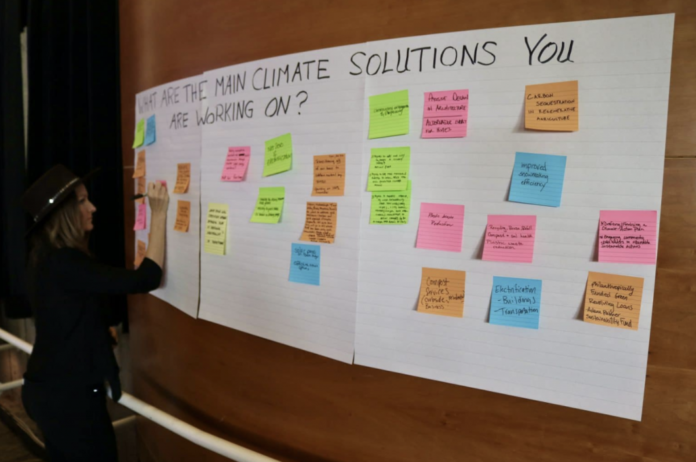Carolyn Paletta/Vail Daily
Environmental and sustainability advocates from mountains across the United States gathered in Breckenridge to hear photographer and filmmaker Pete McBride speak about his time on the Colorado River.
McBride closed out Mountain Towns 2030, a conference focusing on sustainability in mountain towns. Breckenridge hosted the conference, which featured panels and workshops for municipal leaders to learn from each other on how to reduce environmental impacts, from Sept. 20-22. Many of the towns represented sit along or rely on the Colorado River and its basin, where McBride spent years documenting drought conditions in the Western U.S. — including hiking the length of Grand Canyon National Park and padding the entirety of the river.

Eliza Noe/Summit Daily News
“Eight years ago, $26 billion a year was what the Colorado River produced,” McBride said. “That’s T-shirt shops, fly fishing, permits, boating, rafting, picnicking — everything. That would have put the Colorado River on the Forbes 150 list. I think it was up there with U.S. Airways at the time, which is pretty amazing. We don’t think of our natural resources as economic engines. But this one is.”
McBride, who is from Basalt, said that educating not only visitors but also new community members on how important protecting the local environment is could bring about huge impacts on mountain towns. He cited exhibits in airports that educate visitors about the history of the local community as soon as visitors deplane as an example that creates connection to the local community.
“There’s been a huge transition in these mountain towns, and the whole world has moved here and made home,” McBride added. “A lot of them may not love the mountains or the rivers or pay attention to climate change like people who have lived here a long time. I think communities and leaders and communities need to really start changing.”
States across the basin have already begun talks as to which states should make cuts on usage. According to recent reporting from KUNC, the states that use the Colorado River’s water are struggling to agree on terms that will reduce their demand. Now, the federal government is stepping in with a plan to use billions of dollars to incentivize conservation. The U.S. Bureau of Reclamation has now announced it will use part of its funding from the Inflation Reduction Act on short-term water conservation.
“At some point — and it’s going to happen in the near future with the way we’re going with water — water will be the ultimate decider on if you can come live in (mountain communities) or not,” McBride said. “And I think we need to be more in touch with that and more forceful. I think all mountain communities — this group — should get together and say, ‘These are the main things we care about.’”
Carly Castle, the city manager of Moab, Utah, said that climate solutions should be solutions-oriented and collaborative among community groups. She added that focusing on one type of water user — such as agriculture — should not be how communities focus on consumption.
“I feel hopeful about this. The solutions exist and we know what they are,” Castle said. “It’s about implementation, so it’s not like we need special technologies to be developed at the last minute. The answers are there.”
Credit: Source link































